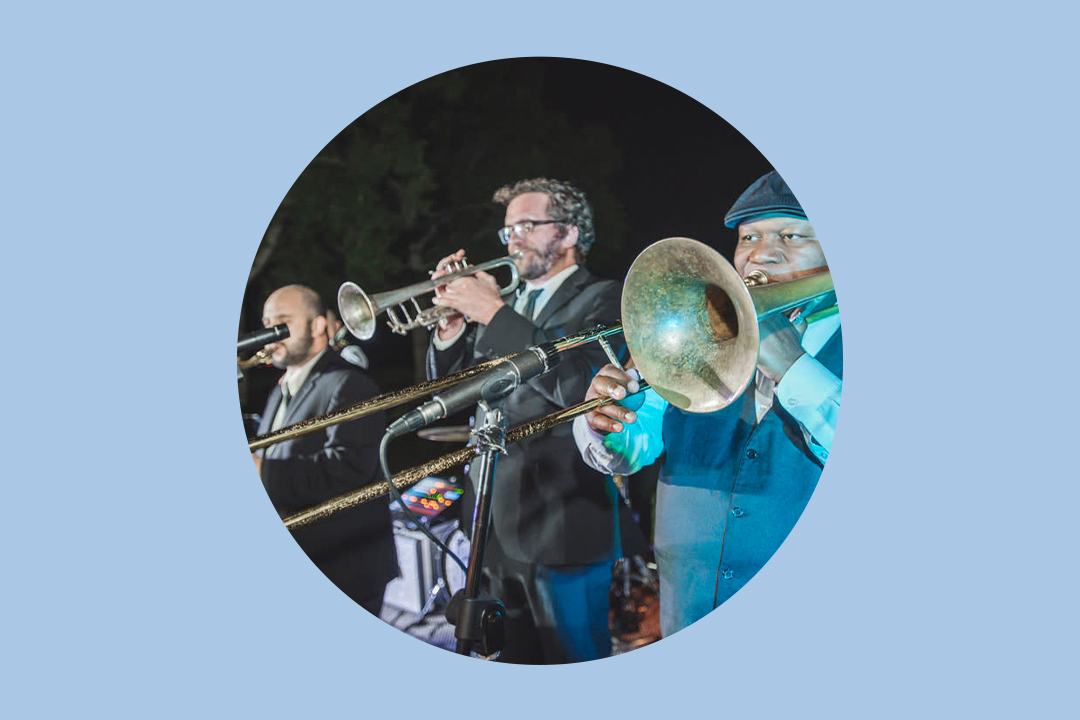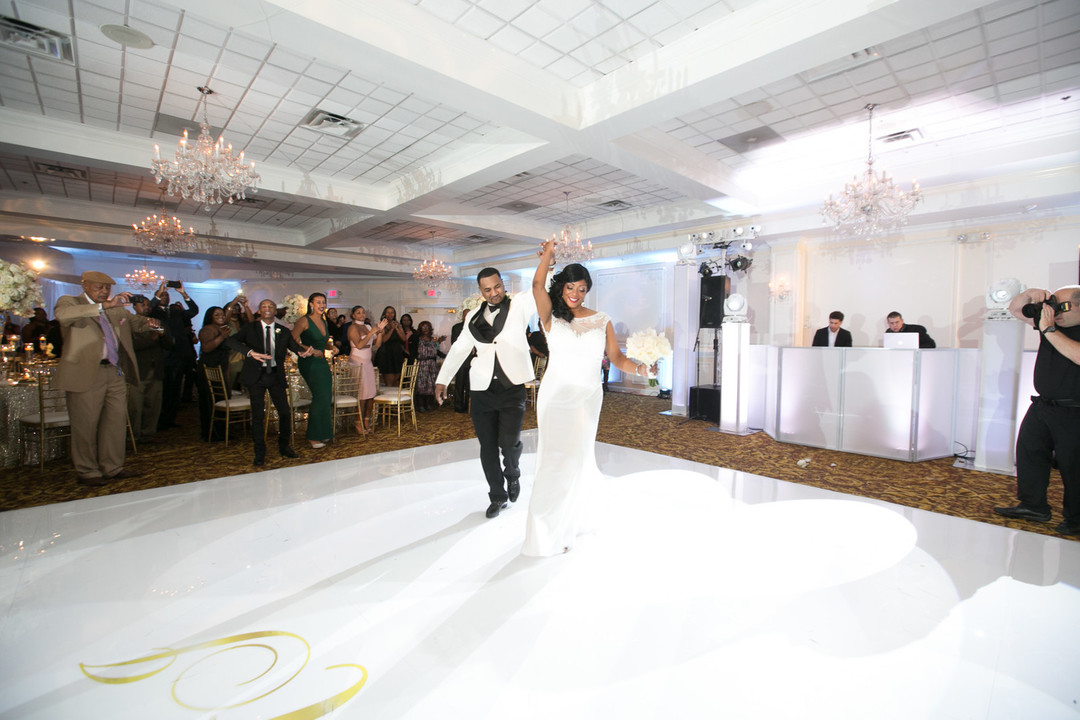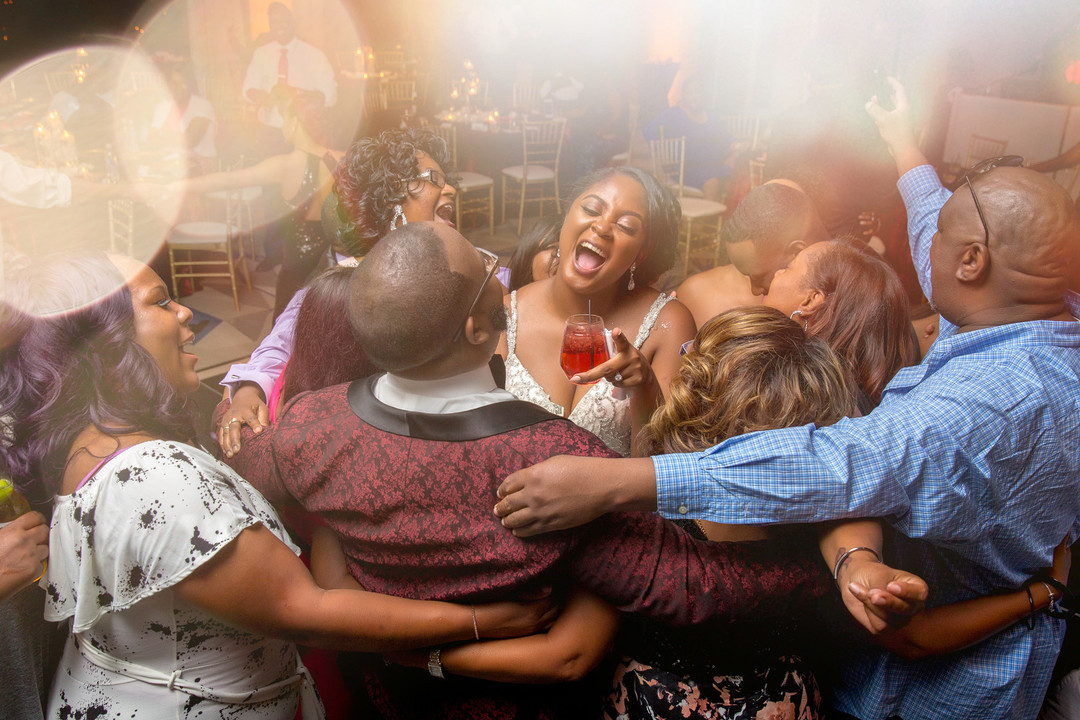- Expert advice/
- Venues & vendors/
- Bands, DJs & music/
- How to Choose Between a Wedding Band or DJ
- Bands, DJs & music
How to Choose Between a Wedding Band or DJ
Your reception entertainment sets the tone for much for your wedding, so it's paramount that your vendor is a great fit. Weigh the pros and cons of wedding bands and wedding DJs to help you choose between the two.
Last updated February 5, 2024

The First Look ✨
- First, consider your budget: a wedding band can cost anywhere between $3,000 and $10,000, while DJs typically don’t cost more than $2,000 or so.
- Next, consider the style of your wedding and your guests-- DJs are able to provide a breadth of music while bands offer a more lively, interactive experience.
- Finally, consider your venue: a band takes up much more space than a DJ, so if space is a constraint your options may be limited.
You booked a reception venue), chose your caterer, and started mapping out your seating chart. Now, your reception needs entertainment. To band or to DJ: That is the question. Every wedding is unique and a live band and a wedding DJ both bring pros and cons. The key is figuring out what works best for you, your wedding style, and your guests. Read on to weigh a few key considerations.
Live Wedding Bands vs. Wedding DJs: Things to Consider
Your Budget
You probably knew we would start here. How much you budgeted to spend on reception entertainment will impact your wedding DJ or band option, though. In almost all cases, a live band will cost more to hire than a wedding DJ. Typically, you can expect to pay between $3000-$10,000 on average for a band. This is thanks to a few factors, including transportation costs for a larger group plus their equipment and instruments. (The bigger the band, the more you pay.)
This fee also covers the actual performance time, any additional equipment you request (projectors or extra lighting), and even song requests. Some bands will charge fees to learn and play new material.
On the other hand, wedding DJs cost around $500-$2000. This range is usually based on experience level. If you hire a wedding DJ who is more of a hobbyist (this isn’t his/her full-time job), they’ll charge less. The more experience or prominence your DJ has, the higher the cost.
Obviously, DJs are less expensive because they’re typically a one-person show—and they require much less equipment. So, if you’re on a tight budget, a wedding DJ may be your best bet.
Your Wedding Style
Your reception music will set the tone for the night—make sure it fits with your wedding style or theme. Are you hosting an intimate dinner party or hoping for a big, lively reception that brings the house down? You want music to enhance your situation.
A string quartet may be the perfect choice for an elegant sit-down or more intimate dinner party set-up. A cover band is a better option if you want your wedding guests to get up and sing along while they dance. You may go for a full jazz band if you and your partner frequent jazz music clubs for date nights. Live music can really drive your theme or style home.
Wedding DJs are a better option if you consider variety the spice of reception life. They can simply provide a much wider breadth of music genre options and can essentially play any song you request. Bands typically come prepared with a previously agreed upon set list—requests aren’t always on the table.
Ahead of your wedding, you and your partner will work with the DJ to come up with a list of must-play songs and, alternatively, a list of absolutely-do-not-play songs. Some wedding DJs welcome requests from wedding guests, others don’t. Be sure to ask any wedding DJs their preferences in this regard ahead of booking.
One last thing on this: While a wedding DJ will play pre-recorded songs (it’s great—your guests will know them and the party won’t stop until the music does), live wedding bands can improvise a bit. A band can work in standout instrument solos, change lyrics, and add any fun twists they see fit, which can be fun for you and your guests, too.

Your Venue Space
Let’s talk logistics. Depending on your venue, restrictions and regulations may apply. Think things like actual physical space, electricity limitations, and even noise stipulations. All of these things can impact your decision between a wedding band or wedding DJ.
Bands need more space—more people, more equipment, etc. A DJ may only require a small table and space for large speakers. It’s crucial that you touch base with your venue ahead of booking your wedding reception entertainment. Don’t set your heart on an 8-piece band only to find out the space can’t accommodate the size or electrical needs of a band.
Your Guests
While your wedding day is a celebration of you as a couple, remember that you’re also essentially hosting an event for others. Consider your guest list before choosing your entertainment. Think about the age range of your guests and the general preferences of the group.
A wedding DJ will be able to create a setlist that includes a variety of hits from all genres and for all generations. You can cover Top 40 hits and have a few Frank Sinatra moments, too. Live music is generally just entertaining to watch and provides a focal point—great for those guests who prefer not to dance. Younger guests may not vibe with a band’s take on songs, and, as we said, the song choices may be limited regardless.

Wedding Band or Wedding DJ - Which is right for you?
To help organize your conflicted thoughts, here’s a quick rundown of the major pros and cons of both wedding bands and wedding DJs.
Pros and Cons of a Live Wedding Band
- Pro: Unique and memorable. Live bands provide one-of-a-kind experiences. Musicians can exercise spontaneity (lyric changes, solos, mash-ups) to make their performance particularly special for your wedding.
- Pro: Great for themes. A live band adds a special touch that makes your reception feel truly authentic and enhances your wedding style
- Pro: Live musicians are skilled at gauging a crowd and knowing when and how to amp up their performance.
- Con: Less variety. Most bands have a limited repertoire, especially if they’re a cover band or stick to a single style (jazz band).
- Con: Require more space. It’s a lot of people and a lot of equipment.
- Con: More expensive. Again, it’s a lot of people and a lot of equipment.
- Con: Bands require more substantial breaks. This can cause lulls in your reception energy.
Pros and Cons of a Wedding DJ
- Pro: DJs can provide much more variety. They simply have access to more music and the ability to change genres quite fluidly.
- Pro: Less spacious. A single DJ and booth require far less space than a band and instruments.
- Pro: Fewer breaks needed. If and when a DJ takes a breather, they can keep the energy high by simply lining up a few songs.
- Pro: Less expensive. By nature, wedding DJs are less expensive than wedding bands thanks to less equipment and fewer people.
- Con: For those who aren’t interested in dancing, DJs might not be as entertaining and enjoyable.
- Con: Less personal. Beyond talking into a mic, a DJ can’t alter or personalize their music for the couple.
Ultimately, your reception entertainment is up to you. As you scout options, be sure to ask for live performance viewings, if possible. Go see a potential band play and ask a potential DJ for any recordings of his/her sets. Whether it's a Philadelphia wedding band or Los Angeles wedding DJ, live-action can make all the difference.
- Expert advice/
- Venues & vendors/
- Bands, DJs & music/
- How to Choose Between a Wedding Band or DJ
Find even more wedding ideas, inspo, tips, and tricks
We’ve got wedding planning advice on everything from save the dates to wedding cakes.
